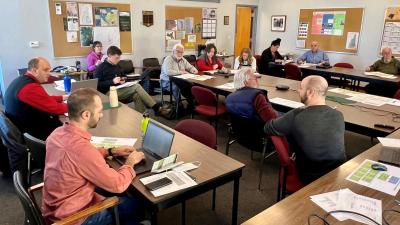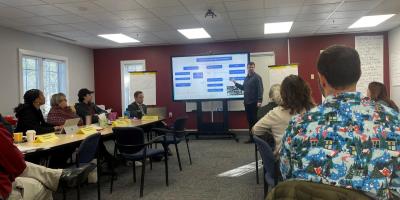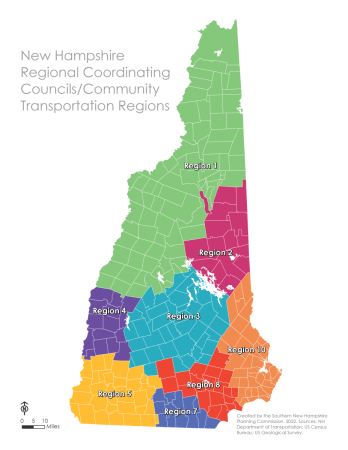RCC 8 and Statewide Coordination
Regional Coordination - Region 8 RCC
Next RCC Meeting: May 21, 2024, 12:30pm (Agenda/Zoom info forthcoming)
Proposed Bylaws for RCC approval @ May 2024 meeting
2022 Coordinated Human Services Public Transportation Plan
(adopted by SNHPC MPO 9/27/22)
Beginning in June 2021, meetings are now being held in hybrid (in-person/Zoom) format. However, a quorum of seven (7) is needed at the meeting place to constitute a quorum and allow official business to be conducted. NOTE: Regions 8 (Greater Manchester) and 9 (Derry-Salem) officially merged in January 2020.

New Hampshire is divided into eight Community Transportation Regions (see map below). Each region has an associated Regional Coordinating Council (RCC), which is composed of local transportation providers, human service agencies, funding agencies and organizations, consumers, regional planning commission staff, and the mobility manager for that region. The RCCs work to develop information that is helpful to transportation service users, identify opportunities for coordination between service providers, and advise the SCC as to the state of coordination in the region.
At the regional level, RCCs create/implement coordinated transportation plans, maintain a directory of regional providers, and solicit projects for Federal Transit Administration's (FTA) 5310 program.
RCC resources
- Region 8 RCC Coordinated Plan (2022)
- FY2022-23 FTA 5310 RCC Activity Summary
- FY2021 FTA 5310 RCC Activity Summary
- Region 8 RCC Coordinated Plan (2016)
- Region 9 RCC Coordinated Plan (2016)
- Age-Friendly Presentation to CART Board (April 2020)
- Volunteer Driver Program (VDP) Map (2020)
- New Boston Shuttle Flyer (July 2020)
- Region 1 (Grafton-Coos Counties)
- Region 2 (Carroll County)
- Region 3 (Mid-State)
- Region 4 (Sullivan County)
- Region 5 (Cheshire-Monadnock)
- Region 6 (merged with Region 5)
- Region 7 (Greater Nashua)
- Region 8 (Southern New Hampshire)
- Region 9 (merged with Region 8)
- Region 10 (Southeast)
*Minutes of past Region 8 RCC meetings available upon request*
Statewide Coordination
 The NH State Coordinating Council for Community Transportation (SCC) was created by the NH State Legislature to foster and guide coordination efforts at the regional level. The goal is to reduce duplication, increase the availability of service, and make scarce resources go further as the need for transportation increases with an aging and growing population. The duties of the SCC are to:
The NH State Coordinating Council for Community Transportation (SCC) was created by the NH State Legislature to foster and guide coordination efforts at the regional level. The goal is to reduce duplication, increase the availability of service, and make scarce resources go further as the need for transportation increases with an aging and growing population. The duties of the SCC are to:
- Develop, implement, and provide guidance for the coordination of community transportation options within New Hampshire so that the public, in particular citizens in need of access to essential services and activities, can access local and regional transportation services and municipalities, human service agencies, and other organizations can purchase shared-ride coordinated transportation services for their citizens, clients, and customers.
- Set statewide coordination policies for community transportation, establish community transportation regions, encourage the development of regional coordination councils, assist other regional efforts as needed, and monitor the results of statewide coordination.
- Approve the formation of regional coordination councils and the selection of regional transportation coordinators, according to such criteria and guidelines as the SCC my establish.
- Solicit and accept donations for funding to implement and sustain community transportation.
SCC Resources


